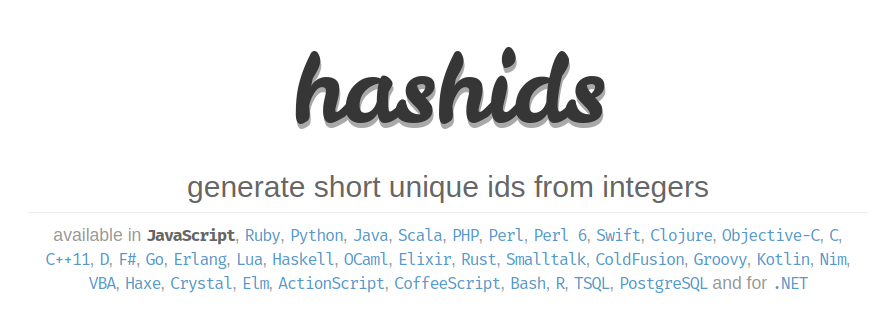UUID
The only ID you need?
ARKADIUSZ KONDAS
Lead Software Architect
@ Proget Sp. z o.o.
Zend Certified Engineer
Code Craftsman
Ultra Runner
@ ArkadiuszKondas



Zend Certified Architect

php-ai/php-ml



Genesis
Database

node (entity)
edge (relation)
Primary key
Main role: to provide a stable, indexable reference to an entity.
-
semantic / natural
extracted from the entities attributes (one or more fields)
-
technical / surrogate
completely unrelated to the fields of its entity
constructed when the entity is inserted in the DB.
Auto-increment / serial
> CREATE TABLE customer (
id SERIAL PRIMARY KEY,
name VARCHAR(255) NOT NULL
);> INSERT INTO customer (name) VALUES ('John');> SELECT * FROM customer;
id | name
----+------
1 | John
(1 row)
> SELECT currval('customer_id_seq'::regclass);
currval
---------
1
(1 row)
Why can be a problem?
-
Information disclosure
In url: /api/user/123
all it takes to know your user count is to create an account and look at link
-
Entity enumerations
easy to scrape all your entities (just start from 1 and ++)
-
Non uniqueness across tables

ON DELETE CASCADE
Why can be a problem?
Database round trip
$customer = new Customer('John', 'Snow');
$orm->persist($customer);
$orm->flush();
$customer->id();Workarounds
- You can configure your sequence to start at an arbitrary point
- Have an increment bigger than one
- Share the sequence between tables
Workarounds
Obfuscation
hidden secret key is required (salt)
zackkitzmiller/tiny-php
$tiny = new \ZackKitzmiller\Tiny('5SX0...M3so9bfzZpuUenKtP74QNH6B');
echo $tiny->to(5);
// E| 1 | Z4UrtW |
| 3456 | gPUasb |

Workarounds
Obfuscation


the salt can be guessed from about 30 hashes !!!


UUID FTW

U U ID
universally
unique
identifier
RFC 4122
Specific variant with 5 version
U U
universally
unique
Possible values: \(2^{122}\)
Collision: number of random version 4 UUIDs which need to be generated in order to have a 50% probability of at least one collision is 2.71 quintillion - generating 1 billion UUIDs per second for about 85 years
45 EB


Unsigned 128-bit integer
13318733430041633863711167238917637152132 hexadecimal (base 16) digits
6432f291-9a6b-42ba-8e73-9e7cb327a941Anatomy
6432f291-9a6b-42ba-8e73-9e7cb327a941time_low
time_mid
time_hi
clock_seq_hi_and_res
node
version
variant
ramsey/uuid

Version 1: Time based
use Ramsey\Uuid\Uuid;
for ($i=0; $i<10; $i++) {
echo Uuid::uuid1()->toString() . PHP_EOL;
}06d0af36-bfc2-11e7-a118-02424c396740
06d0f6e4-bfc2-11e7-a58f-02424c396740
06d0f7a2-bfc2-11e7-9265-02424c396740
06d0f824-bfc2-11e7-a503-02424c396740
06d0f932-bfc2-11e7-937b-02424c396740
06d0f9aa-bfc2-11e7-b47a-02424c396740
06d0fa22-bfc2-11e7-9630-02424c396740
06d0fa90-bfc2-11e7-a5d2-02424c396740
06d0fafe-bfc2-11e7-967e-02424c396740
06d0fb6c-bfc2-11e7-9e54-02424c396740Version 3 & 5:
Name based
$namespace = Uuid::uuid3(Uuid::NAMESPACE_DNS, 'phpce.eu');
echo Uuid::uuid3($namespace, '/about');
echo Uuid::uuid3($namespace, '/contact');da099c12-57c5-38bb-a5ca-7a9f0a6f6578
a0f6e622-41b5-3608-b858-8dc231da5c01Hashing algorithm:
- MD5 -> Version 3
- SHA1 -> Version 5
Version 4: Random

use Ramsey\Uuid\Uuid;
for ($i=0; $i<10; $i++) {
echo Uuid::uuid4()->toString() . PHP_EOL;
}c9cb5802-fbc2-4e63-9812-160d6b14af32
7a7e6dea-7c0d-4173-a3c6-5a9f0386e9ad
9af361b5-f0a6-4caa-af7d-ab01a8b8c0fe
95b2a611-b1f7-4496-a911-532e408b8fec
adf887f4-d07c-4149-80a9-a6adf0406490
4bd03549-de3b-49dd-a784-a32388bb777d
843ef345-1632-4960-a0d3-0967b981de99
3fa23ff3-6b80-4a65-bcc2-5a8021cf3fe0
a47b0437-8e7e-43a1-8783-c747080920b4
bdc2334e-f1cb-4c4d-a94d-4f8fe30f1d56Version 2:
DCE Security
RFC 4122 does not explicitly define it
not implemented
ramsey/uuid-console
➜ composer global require ramsey/uuid-console
➜ uuid generate --help
Usage:
generate [options] [--] [<version>] [<namespace>] [<name>]
Arguments:
version The UUID version to generate. Supported are version "1", "3", "4" and "5". [default: 1]
namespace For version 3 or 5 UUIDs, the namespace to create a UUID for. May be either a UUID in string representation or an identifier for internally pre-defined namespace UUIDs (currently known are "ns:DNS", "ns:URL", "ns:OID", and "ns:X500").
name For version 3 or 5 UUIDs, the name to create a UUID for. The name is a string of arbitrary length.
Options:
-c, --count=COUNT Generate count UUIDs instead of just a single one. [default: 1]
--comb For version 4 UUIDs, uses the COMB strategy to generate the random data.
-g, --guid ramsey/uuid-console
➜ uuid decode 2bdaf386-c012-11e7-8d9b-02424c396740
========= ========== ========================================
encode: STR: 2bdaf386-c012-11e7-8d9b-02424c396740
INT: 58293663835462406327300766704462292800
decode: variant: RFC 4122
version: 1 (time and node based)
content: time: 2017-11-02T21:09:54+00:00
clock: 3483 (usually random)
node: 02:42:4c:39:67:40
========= ========== ========================================
➜ uuid decode ffab8f50-4510-4c7f-af8f-e0a09f43a868
========= ========== =================================================
encode: STR: ffab8f50-4510-4c7f-af8f-e0a09f43a868
INT: 339843928432163496190993563305967331432
decode: variant: RFC 4122
version: 4 (random data based)
content: ff:ab:8f:50:45:10:4c:7f:af:8f:e0:a0:9f:43:a8:68
(no semantics: random data only)
========= ========== ================================================= Real life example
public function createAction()
{
// ...
$id = (string) UUID::generate();
$this->getContainer()->get('command_bus')->handle(
new CreateCustomer(
$id,
'Proget Sp. z o.o.',
'ul. Warszawska 28 43-430 Bielsko-Biała',
'Jan Kowalski',
'info@proget.pl',
'+48 33 822 14 85'
)
);
// ...
}Uuid:uuid4() collisions

Uuid:uuid4() collisions #80
private static function generateBytes($length)
{
if (self::hasOpensslRandomPseudoBytes()) {
return openssl_random_pseudo_bytes($length);
}
$bytes = '';
for ($i = 1; $i <= $length; $i++) {
$bytes = chr(mt_rand(0, 255)) . $bytes;
}
return $bytes;
}Uuid:uuid4() collisions #80
OpenSSL’s default random number generator mixes in the PID, which provides a certain degree of fork safety. However, once the PIDs wrap, new children will start to produce the same random sequence as previous children which had the same PID.
Solution
openssl_random_pseudo_bytes()random_bytes()>= PHP 7
< 7
paragonie/random_compat
PHP 5.x polyfill for random_bytes() and random_int() from PHP 7Level: advanced
COMB
- Combined UUID version 4 with timestamp
-
Replaces the least significant bytes of the node field with the current timestamp
-
Tries to compensate for the reduced clustering in database indexes
COMB
$factory = new UuidFactory();
$generator = new CombGenerator(
$factory->getRandomGenerator(),
$factory->getNumberConverter()
);
$factory->setRandomGenerator($generator);
$combUuid = $factory->uuid4();Override Time Generator
$factory = new UuidFactory();
$factory->setTimeGenerator(
new PeclUuidTimeGenerator()
);
$uuid = $factory->uuid1();use pecl-uuid as time generator
Override Random Generator
$randomLibFactory = new \RandomLib\Factory();
$randomLibGenerator = $randomLibFactory
->getHighStrengthGenerator();
$uuidFactory = new UuidFactory();
$uuidFactory->setRandomGenerator(
new RandomLibAdapter($randomLibGenerator)
);
$uuid = $uuidFactory->uuid4();use ircmaxell/random-lib library as random generator
More customization
- Generators:
- RandomGeneratorInterface
- TimeGeneratorInterface
- Codecs:
- CodecInterface
- Converters:
- NumberConverterInterface
- TimeConverterInterface
- Providers:
- NodeProviderInterface
- TimeProviderInterface
UUID
in
Database
UUIDs in PostgreSQL
> select '74546161-06ea-42be-a27d-f070461557e1'::uuid;
uuid
--------------------------------------
74546161-06ea-42be-a27d-f070461557e1
(1 row)
CREATE EXTENSION "uuid-ossp";
-- or CREATE EXTENSION "pgcrypto";
CREATE TABLE customer (
id UUID PRIMARY KEY DEFAULT uuid_generate_v4(),
name VARCHAR(255) NOT NULL
);UUIDs in MySQL
BINARY(16)
Uuid::uuid4()->getBytes();$factory = new UuidFactory();
$codec = new OrderedTimeCodec(
$factory->getUuidBuilder()
);
$factory->setCodec($codec);
Uuid::setFactory($factory);Generate an optimized version 1 (time-based) UUID object
Performance
Horizontal axis – Number of inserts x 25,000
Vertical axis – Time Taken in seconds
Time

Performance

Horizontal Axis – Number of inserts x 25,000
Vertical Axis – Data Size in MB
Size
Performance
-
MySQL
https://www.percona.com/blog/2014/12/19/store-uuid-optimized-way/
-
SQL Server 200
http://www.informit.com/articles/printerfriendly/25862
-
PostgreSQL
http://www.cybertec.at/int4-vs-int8-vs-uuid-vs-numeric-performance-on-bigger-joins/
+ 10%
ramsey/uuid-doctrine
When UUID is not what you need
When UUID is not what you need
- no mutable state, no technical primary key
- strong storage constraints (2 to 4 times more space)
- you don't expose the primary key
- big database with big numer of relations
Best of Both = Integers Internal, UUIDs External

Alternatives
ulid

https://github.com/alizain/ulid
cuid
https://github.com/ericelliott/cuid

Tailor made
CREATE OR REPLACE FUNCTION insta5.next_id(OUT result bigint) AS $$
DECLARE
our_epoch bigint := 1314220021721;
seq_id bigint;
now_millis bigint;
shard_id int := 5;
BEGIN
SELECT nextval('insta5.table_id_seq') %% 1024 INTO seq_id;
SELECT FLOOR(EXTRACT(EPOCH FROM clock_timestamp()) * 1000) INTO now_millis;
result := (now_millis - our_epoch) << 23;
result := result | (shard_id <<10);
result := result | (seq_id);
END;
$$ LANGUAGE PLPGSQL;https://engineering.instagram.com/sharding-ids-at-instagram-1cf5a71e5a5c

Summary
Summary
- Unique across every table, every database, every server
- Allows easy merging of records from different databases
- You can generate IDs anywhere, instead of having to round trip to the database
- Most replication scenarios require GUID columns anyway
- It is a whopping 4 times larger than the traditional 4-byte index value
- Cumbersome to debug "where userid='BAE7DF4-DDF-3RG-5TY3E3RF456AS10"
- The generated UUIDs should be partially sequential for best performance
Other languages
Java, Scala (native)
java.util.UUID.randomUUIDNode.js (Install uuid from npm)
var uuid = require("uuid");
uuid.v4();Haskell (Install uuid from hackage)
uuid :: IO UUID
uuid = nextRandomQ&A
Thanks for listening
@ ArkadiuszKondas

https://slides.com/arkadiuszkondas
https://joind.in/talk/959bf
